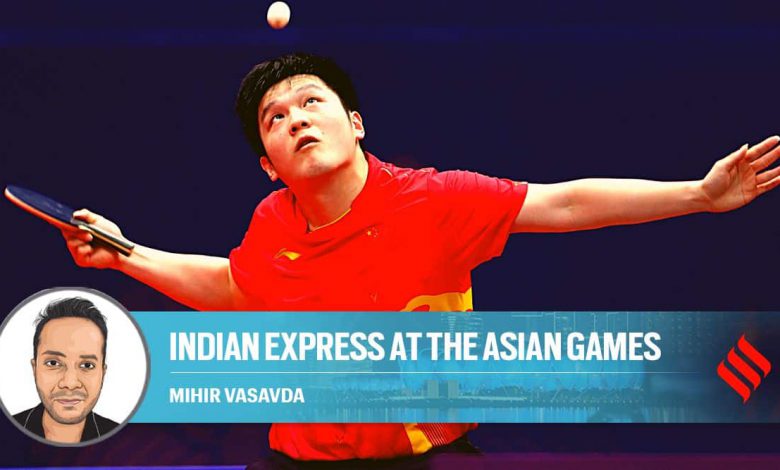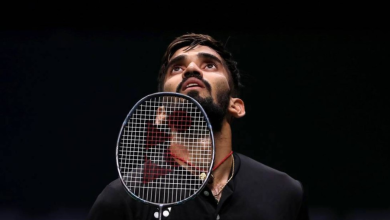How intimidating is it to play Fan Zhendong, the Virat Kohli of table tennis, in China? | Asian-games News

Hangzhou: He tries not to show it, but as he lifts the paddle to serve, Jang Woojin’s hands quiver.It’s the semifinals of the Asian Games. And the match has gone off the script. The South Korean has made the ‘make’ of taking a game off Fan Zhendong. The Chinese world number 1 and two-time world champion doesn’t look like he needs outside help. But the crowd has made this personal.
They worship Zhendong here. And that’s putting it mildly.
A Chinese journal tells a story that recently was a trending topic for days. Zhendong was staying at a hotel in Beijing. When he stepped out, a fan connived with the hotel staff, snuck into his room and stole his underwear.
This other time, the Zhendong diehards took over an airport in southern China’s Guangdong province before he could board a flight. In this country of obsessive selfie hunters, the fans wanted their biggest table tennis star to sign autographs and pose for photos. Zhendong couldn’t board the flight and this earned fans his rebuke.Quite literally, he shouted at them. But they haven’t stopped loving him.
For a small, stocky man, Zhendong has a big aura. To contextualise, Ma Long is the Tendulkar of Chinese TT; Zhendong is Kohli. The difference, however, is there isn’t just one Tendulkar or Kohli. Like Pakan’s pace-bowling factory, the Chinese boast of being the ‘only country where a kid from the street can grow into a Ma Long.’
It doesn’t matter if this is fact or fiction. In the magical and mystical universe of Chinese ‘ping pong’, everything passes.
“The reason why ping pong is so popular is because people from their elementary school days have played the sport,” says Zhang He, an executive producer with the China Global Television Network. “Like me… everyday after class, we ran out of the buildings to find a ping pong table and play. Every school will have a table.”
You can read all of Mihir Vasavda’s stories from Hangzhou here
It’s a simple numbers game. In what was until recently the world’s most populous country, countless number of children begin training at an age of four and five, try and get selected for the drict team the time they turn 10, from there fight for a spot in the provincial team, which is the stepping stone to the national side.In an interview with the Olympic Channel, Deputy secretary of the China Table Tennis Association estimated that 80 million people play table tennis in the country.
In this ruthless system, only the cream makes it to the top. The rest spend years on the reserves bench or in some cases, leave the country in frustration and play elsewhere, like Han Ying did for Germany or Singapore’s Feng Tianwei. Not good enough for China, these players became Olympians for their adopted lands.
The answer for China’s dominance can be found inside a building roughly a two-hour drive away from Hangzhou. At the China Table Tennis College – the world’s only school dedicated to the sport – they not only teach the sport but also study it with the help of humans and robots.
Futuric technologies – from rubbers and balls – are designed, developed and tested here before introducing them to the rest of the world, giving the Chinese a head start.
Pongbot helps players
Before the Tokyo Olympics, they developed a ‘pongbot’ that served as a sparring partner for the players and cloned the playing style of China’s biggest international rivals. It’s one of the reasons why they say it’s rare for a Chinese player to lose twice to the same opponent.
The scale of the system and support is unprecedented but ping pong isn’t an emotional investment as, say, football or basketball. It is, however, a constant source of national pride.
One user on Weibo, the Chinese equivalent of Twitter, called it a ‘slap on the face’ when Sutirtha Mukherjee and Ayhika Mukherjee stunned the world champions from China in the quarterfinals.
It’s also why, two days after the ‘insult’ they couldn’t see another Chinese champion being pushed around a non-Chinese opponent. A second seismic-level shock amidst the mid-autumn festivities would have been too much to digest. That too, Zhendong.
And so, they create a ruckus.
The Gongshu Canal Sports Park Gymnasium isn’t exactly a colosseum. But when packed to capacity, the 7,000 spectators tower on the playing area and create a din.
It might be impolite to make noise during rallies but when South Korea’s Jang prepares to serve, someone cracks a joke when he stares longingly at the ball, drawing laughter from the stands. A few words are said in Mandarin and a deafening roar follows.
Zhendong feeds off the chants. His explosive footwork and powerful forehand loops puzzle Jang. He plays a shot that one spectator called a ‘fairy ball’. He meant that the spin is so sudden and sharp that it almost feels like a fairy carries the ball after it leaves his paddle to the other side and swirls it in a different direction.Most Read
1
Jawan box office collection day 26: Shah Rukh Khan’s blockbuster refuses to slow down, nears Rs 1100 crore worldwide gross
2
Asian Games 2023 Day 10 Live Updates: India close in on record gold medal haul after Parul Chaudhary, Annu Rani’s wins; Tejaswin Shankar bags silver
See More
Another return begins from at least a foot outside the table, curls so sharply that even Roberto Carlos’ banana kick would pale in comparison, bounces on the edge and hits Jang.
The South Korean scratches his head, wondering what just happened. Three points later, it was game over.Jang quickly looks for the exit and looks relieved more than sad. “I was afraid,” Jang admitted, talking to The Indian Express after the match. “To play Fan Zhendong is tough. To play him in China is tougher. And in an atmosphere like this… I was afraid.”
China’s most popular player was defeated in the final. This time, the crowd didn’t mind. For, his slayer was Wang Chuqin; the heir apparent in Chinese TT’s royal line of succession.







